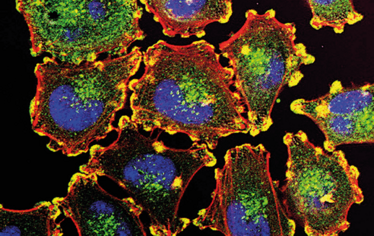Herpes vs Cancer
A newly approved oncolytic immunotherapy takes on cancer using a live modified herpes virus

A new drug for an aggressive form of skin cancer has been approved by the FDA, and recommended for approval by the EMA. The therapy has caused a bit of a buzz because it’s the first of its kind in a drug class known as oncolytic immunotherapies; the drug – Imlygic (talimogene laherparepvec) – is a live oral herpes virus (herpex simplex virus-1) that has been genetically modified to selectively attack cancer cells without harming normal tissue.
The drug originally stems from a spin out from University College London – BioVex, which was purchased by Amgen in 2011. The genetic code for the virus is rumoured to have originally been taken from the cold sore of a BioVex employee... The drug is injected directly into the tumor where it uses the cell’s energy to replicate – eventually overwhelming the cell. Once the cell dies, copies of the virus enter the patient’s bloodstream to infect more tumor cells. The virus also produces the protein GM-CSF, which helps to stimulate the immune system to join the battle by recognizing and destroying tumor cells. The drug can enter healthy cells too, but it cannot replicate inside them or kill them. Specifically, the drug has been approved for the treatment of adults with skin melanoma that cannot be removed by surgery.
While the science behind oncolytic immunotherapies is intriguing, one challenge that remains is boosting the number of people who respond. A statement from the FDA explains that studies of Imlygic have shown that 16.3 percent of patients experienced a decrease in the size of their skin and lymph node lesions, lasting for a minimum of six months, compared to 2.1 percent of patients receiving a comparator therapy (1). The agency added, “However, Imlygic has not been shown to improve overall survival or to have an effect on melanoma that has spread to the brain, bone, liver, lungs, or other internal organs.” The EMA says that the drug has also not been compared with other recently approved medicines for melanoma, such as anti-PD-1 therapies Keytruda and Opdivo.
The Cancer Research Institute believes that there could be advantages in combining several agents that target a different part of the multi-step immune response (2). For example, Imlygic could be used to jumpstart an immune response, with other drugs keeping the response going long enough to wipe out all the cancer cells in the body.
- FDA Press Release, “FDA approves first-of-its-kind product for the treatment of melanoma,” (October, 2015). www.fda.gov
- M. Tontonoz, “FDA Approves First in a New Class of Immunotherapies,” cancer Research Institute (October, 2015).

Making great scientific magazines isn’t just about delivering knowledge and high quality content; it’s also about packaging these in the right words to ensure that someone is truly inspired by a topic. My passion is ensuring that our authors’ expertise is presented as a seamless and enjoyable reading experience, whether in print, in digital or on social media. I’ve spent fourteen years writing and editing features for scientific and manufacturing publications, and in making this content engaging and accessible without sacrificing its scientific integrity. There is nothing better than a magazine with great content that feels great to read.



















